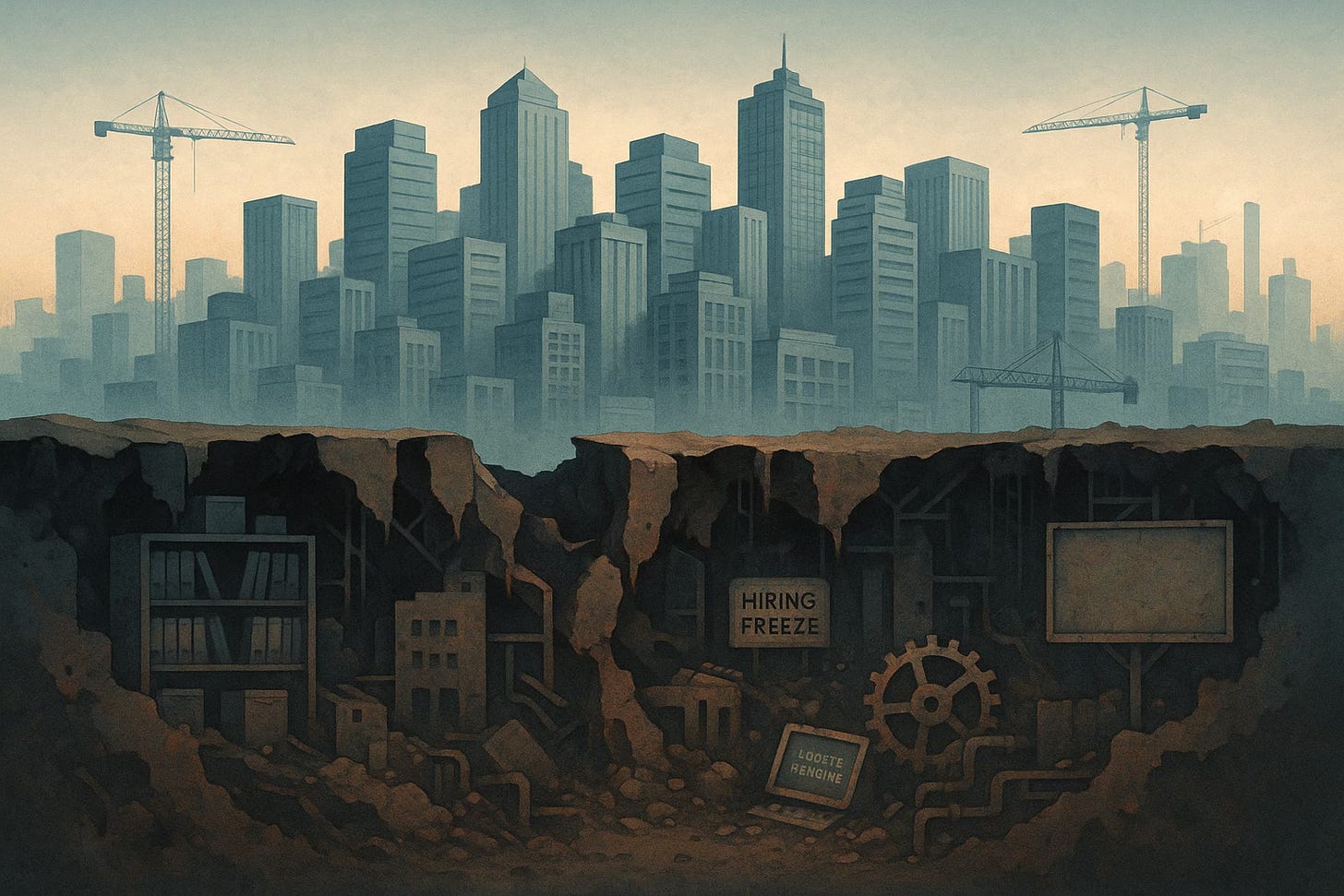Waller’s tone shifted
Near stall speed and flashing red.
Christopher Waller's speech to the Money Marketeers on July 17th wasn't subtle. The Fed governor basically stood up and said what nobody at the central bank wants to admit: the labor market is cooked, and they know it.
"Near stall speed and flashing red."
That's how Waller described private-sector job growth. Not exactly what you'd expect from an institution that's spent months insisting everything's fine. The private sector added 74,000 jobs in June. Seventy-four thousand. In an economy of 340 million people.
But here's where it gets weird. Waller's making this argument now, weeks before the Fed's July meeting, when almost nobody else on the board is backing an immediate cut. Michelle Bowman's the only other voice in his corner, and surprise, she's also a Trump appointee from the first term. The politics are so obvious they're almost boring.
John Williams said the labor market was solid literally the day before Waller's speech. These people are looking at the same data and seeing completely different realities.
The view from corporate America tells a different story. Take the ad world, where directors who jumped from agencies to the client side during Biden's term are now checking their logins every Monday morning, wondering if this is the week. Four years of smooth sailing, and suddenly 20% budget cuts are the norm. Agencies getting decimated by the downstream effects.
Next year's budgets? Even worse.
The tariff stuff is where Waller really loses the plot. He claims tariffs are one-off price increases that won't spiral into inflation. Foreign suppliers and U.S. importers will supposedly eat most of the cost. Come on.
Anyone who's worked in business knows how this goes. Suppliers don't absorb 25% tariffs out of charity. Those costs cascade through everything. Importers raise prices. Retailers bump prices. Eventually wages have to rise because people can't afford groceries. Then businesses raise prices again to cover wages. It never ends.
But Waller needs the tariff fairy tale because otherwise his rate-cut argument falls apart. If tariffs are inflationary, the Fed should raise rates, not cut them. So we get this twisted logic where massive trade barriers somehow get absorbed painlessly by foreign companies who definitely won't pass costs to American consumers. Sure.
What's not being said matters more. Nobody's talking about the AI efficiency layoffs across tech. The shadow layoffs dressed up as transformation initiatives. The hiring freezes that don't show up in data because you can't count jobs that were never posted. Contractors quietly let go, consultants not renewed, projects indefinitely postponed.
The labor market's hollowing out from the inside while the statistics still look okay.
Trump wants 300 basis points of cuts, in 100-point chunks. Even Waller's only talking about modest quarter-point moves. The gap between what Trump wants and what any reasonable central banker would do is almost comic.
Working in highly regulated industries right now is its own special nightmare. The administration blows up regulations daily, leaving companies in no man's land. Can't follow the rules because they keep changing. Can't invest in anything because it might be worthless by deployment. Damned if you do, damned if you don't.
The bond market isn't buying it either. Remember September 2024? Fed cut by 100 basis points, and the 10-year yield rose by 100 basis points. The market has its own ideas.
Watch what happens when unemployment numbers finally catch up to reality. All those shadow layoffs, frozen budgets, companies preparing for the worst. Eventually it shows up officially.
The irony kills though. Trump might get his rate cuts, not from pressure but because his policies tank the economy so hard the Fed has no choice. Create enough chaos and you'll get the crisis response you wanted. It's almost genius if it wasn't so destructive. Using tariffs to cause layoffs to force rate cuts while thinking tariffs actually stimulate growth.
Professional workers across industries are living in constant low-grade fear now. Companies cutting budgets preemptively because they see what's coming. Everyone just trying to survive whatever's next. Healthcare getting hit with grant cuts. Construction facing a frozen housing market this winter. Tech, transport, airlines, ports, manufacturing, government.
Fed officials can debate theories about one-off price increases all they want. Maybe that's what Waller's really saying beneath the econospeak. Not that we should cut because the labor market is weak, but because he knows what's coming.
Or maybe he just wants to be Fed Chair.


